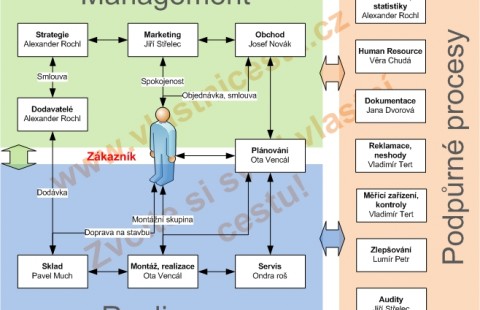The crisis manager's mission is to help the client through a crisis period that almost every company gets into sooner or later. He or she is an experienced manager who can do the job well, if certain rules work. Which are they and what to set right at the start of such collaboration?
You have certainly heard the term crisis management. In recent years that phrase has been over used, and I often heard quotes such: "Sure, crisis management, I've done that before", "We don't need that! We always found a solution without it, so why should we need it now?', "We're fine and everything works well here." Frankly, I'm not surprised at some of these comments. The quality of advice in this area is still not at a very high level in the Czech Republic, which is why many company owners and directors are trying to deal with the crisis situations in their own way. Therefore, in many cases this way of dealing is often influenced by opinions like: "I don’t want to talk about it with someone who I don’t know and share with him/her the details about our situation," "Oh, no! I'm not going to be a jerk!" And sometimes there are even close friends to whom the owner/director confess. And those friends become the consultants over-night or perhaps they know someone who they can recommend. Sometimes the whole thing comes to a happy end, but often it turns into a disaster.
5 KEY RULES FOR COOPERATION WITH CRISIS MANAGER
Finally, when owner or director emboldens and starts searching for a crisis manager, this ritual is often reminiscent of the search for a "temporary partner." A partner we need to confide to, we can fully trust, and gain truthful references from him. However, this entire cocktail must contain the most important ingredient! And that's a mutual chemistry. You just can't do it without it. If it falls short, sooner or later a problem will occur. Therefore, it is a good idea to always imagine that this is the person with whom you will be dealing a big range of problems, crises or even conflicts. I am convinced that such chemistry is the most important building block of a relationship between an owner/director and a crisis manager. This chemistry is a good catalyst for any crisis, like in marriage.
You may think these are just phrases, but believe me, only practice has taught me not to neglect these principles when getting down to something new. So, what are the rules of this “temporary marriage”?
RULE #1: YOU ARE THE ONE WHO CHOOSE YOUR PARTNER – NOBODY ELSE
I often see situations when a crisis manager is selected or recommended to the owner/director even he did not review any of the resumes or commented the list of candidates. It doesn't really work like that! It's the same like your mother would be choosing your wife or husband. Therefore, I recommend you to devote a truly sufficient amount of time and energy into choosing a crisis manager properly. After all, you're looking for a person who's going to take your company out of the crisis hand in hand with you! And it's not just that, and it's not a little. If both of you are not compatible partners, then all effort is vain on both sides. It's also often seen that the owner/director doesn't give enough attention to the presence of a crisis manager. The communication often works in the form of: "Go over there, do something about it, and then tell me how it went," "I'm sorry, I don't have time for you," or something along the lines: "What do you want now! I'm very busy. You know where we stand, don't you?"
Lesson learned: Whoever choose the crisis manager, he/she has the final say on the choice. The role of crisis manager must always have sufficient attention in eyes of any owner or a director.
RULE #2: Insincerity does not pay off
You wouldn't believe how many owners or directors are dosing a problem to the crisis manager in pieces. It is mainly because they fear to look stupid or be lectured or not understood. There is no doubt that such unexpressed trust creates the first problems. You certainly desire this relationship will work successfully, so don't ever try to keep surprises in your drawer. If you really want someone to help you overcome the crisis, it can't be fixed without honesty. Sometimes the crisis manager is caught off guard by new information or a situation that he can no longer handle like the owner would expect to. Unfortunately, it results to an action that a cranky owner shifts the responsibility. That’s why many projects fail. It is pity because the crisis manager failed mainly due to lack of information and communication.
Lesson learned: It is the best policy to be honest with yourself and frank to the crisis manager.
RULE #3: Confidentiality matters
Act as one team. Work together and mutually agree on objectives, direction and steps taking you through the crisis period. Don’t forget to communicate them unambiguously to the rest of the team in the company. Keep in mind that, especially in a state of crisis, staff and colleagues are very sensitive to comments from management and any behind-the-scenes information. Employees in a state of crisis need clear and explicit information, particularly when they are asked to work effectively in such situation. They need reassurance that the investor, the owner, the director and the crisis manager operate in accordance. Only then everyone can reach a happy destination, no matter what the goal is or whether the information is positive or negative.

Legal aspects of insolvency and reorganization

The Real | Interim Manager for Your Changes

Manager work model

Time management - making use of time effectively

Jak správně tvořit mapu procesů

Modelling and setting the processes and procedures - ISO 9001

Training - preparation of the SWOT analysis and strategy

Company Management System of Quality Step by Step - ISO 9001

Process map acc ISO 9001 - business offer
If the owner changes his mind or is not comfortable with something, he should discuss it with the crisis manager first, and then they communicate the change together. Unfortunately, in a number of cases, you'll see the owner makes a deal with the crisis manager, but then he goes and communicates the information to someone inappropriate and also in a different way than was agreed, i.e.: "Hi, Frank, please, the guy is coming tomorrow, you know. Please, give him whatever he wants, and then you and I will work out what to do, and how to do it," "Madam, whatever Mr. Crisis Manager says, remember, I am still in charge here! It is still my factory, so we'll do it my way," etc. I’m sure you would be able to come up with other similar comments.
Lesson learned: Always communicate to the company or project team in a consistent and unambiguous manner.
RULE #4: Hearing is one of the five senses, but listening is an art
You will very often come across spoken or unspoken sentences from the owners/directors such as: “Please, how can you comment on this, if you don't understand it at all...", "You've been lecturing me here long enough, but I built the company, so I know best what's good for it!" etc.
Try to listen to the crisis manager. His role is not to diminish your experience of building your company. Believe me, it's not in the interest of a good crisis manager to lecture you either. Take advantage of his insight into problem solving. As neither you or anyone else who have spent such a long time in the role, still have a clear and distant overview of current situation.
Lesson learned: Listen to the project manager. After all, the final decision on goal and steps is still up to you.
RULE #5: ROLES IN THE RELATIONSHIP
"Hi, John, please, why this "bloke" has been walking around here for the past two weeks? That's some smart staff to help us…”, “Hey, Mr. Emergency, I'm in charge here, and you're not going to assign tasks to my people without my knowledge…” You've also probably heard similar or identical sentences before, haven’t you? I’m afraid, in a number of crisis projects, roles are not sufficiently named, identified, or even communicated internally. Therefore, it is necessary the role of a crisis manager is clearly introduced, set up and recognized in a company or in a project. For a fruitful and high-quality collaboration among the owner, the director and the crisis manager, it is crucial to define everyone’s role, competencies, objectives, actions and procedures. This needs to be clearly communicated towards the crisis management of the company or to the members of a project. Unless you set these things up properly, you will find difficult to overcome any pitfalls of crisis management cooperation.
Equally important is to report the roles and competencies to the owner, the director and the crisis manager in a grasping way, so that everyone fully understands them without any doubts.
Lesson learned: Set clear rules with your crisis manager and communicate them unambiguously further.
CONCLUSION
Any owner, investor, director should first answer this basic question: Am I able and willing to set these rules between myself and the crisis manager? If you are not, but you still want to go smoothly through a crisis situation, then you need to change your approach or your current crisis manager.
Please, don't take these above-mentioned rules lightly. The reality will show you they are very important for managing a crisis and cooperating effectively with any crisis manager. If you follow them, you can be sure that the crisis manager will certainly be a valuable asset to you.
I wish you a happy handling of your crisis situations, projects and a good selection of a crisis manager.
Webpage of article author - Jakub Zahrádka

